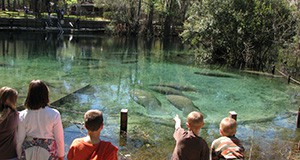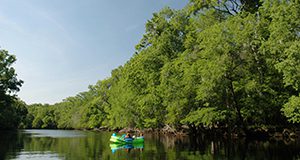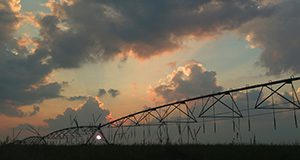Recreation is only one of the benefits people receive from water resources. Water is essential for fisheries and aquaculture, for drinking and bathing, for sanitation, and for spiritual and symbolic purposes, among myriad other uses described in the Economic Value of Florida Water Resources series. This 6-page fact sheet written by Tatiana Borisova, Kurt Oehlbeck, Xiang Bi, Tara Wade, Alan Hodges, Kelly Grogan, and Fe Hei and published by the UF/IFAS is the second part of the series. It discusses the contribution of water-based tourism to the economy in various Florida regions, summarizing a number of economic studies and focusing on freshwater-based recreation, such as canoeing, freshwater angling, wildlife watching, lake- or river-shore hiking, spring diving, and more. Readers can pick and choose the studies most relevant to their geographic area or their area of interest.
https://edis.ifas.ufl.edu/fe1065
Tag: Kelly Grogan
Valuing Florida Water Resources: Households’ Willingness to Pay for Water
This 8-page fact sheet written by Tatiana Borisova, Fei He, Xiang Bi, Kelly Grogan, Tara Wade, and Syed Shah and published by the UF/IFAS Food and Resource Economics Department reviews various methods of examining the value of water availability for household needs. It may be helpful to water resource managers planning investments in water infrastructure to prepare for droughts as well as for analyzing spending on protecting source water availability, for example, by protection of aquifers or increasing the recharge of aquifers, the primary water source in Florida.
http://edis.ifas.ufl.edu/fe1068
Economic Value of Florida Water Resources: Value of Freshwater-Based Recreational Experiences
This 8-page fact sheet written by Tatiana Borisova, Tara Wade, Xiang Bi, Kurt Oehlbeck, and Kelly Grogan and published by the UF/IFAS Food and Resource Economics Department is part 3 of the series “Economic Value of Florida Water Resources.” It uses Florida-based economic studies to provide natural resource professionals and interested citizens with information regarding the value of water-based tourism and recreation in Florida.
http://edis.ifas.ufl.edu/fe1067
Valuing Florida’s Water Resources: Ecosystem Services Approach
This 6-page fact sheet written by Tatiana Borisova, Tara Wade, Xiang Bi, Kurt Oehlbeck, and Kelly Grogan and published by the UF/IFAS Food and Resource Economics Department defines the term “ecosystem services” and presents examples of ecosystem services provided by water resources. It explains three values people assign to water resources and presents a brief overview of the methods that economists employ to measure the value of water.
http://edis.ifas.ufl.edu/fe1064
Economic Value of Florida Water Resources: Valuing the Quality of Water for Household Needs
Florida water-resource professionals deciding whether to implement a costly water protection program or to invest in better tap water treatment technology may wonder: Are such investments justified? What are the benefits of the program or investment decision? Just how highly do Floridians value their water? This 5-page fact sheet written by Tatiana Borisova, Syed Irfan Ali Shah, Tara Wade, Xiang Bi, and Kelly Grogan and published by the UF/IFAS Food and Resource Economics Department reviews studies that help assess the value Floridians assign to maintaining or improving the quality of the water supply.
http://edis.ifas.ufl.edu/fe1059
Valuing Florida Water Resources: Water Use in Irrigated Agriculture
Water resources provide us with a variety of goods and services (altogether often referred to as ecosystem services or environmental services.) Part of a series entitled Economic Value of Florida Water Resources, this 5-page fact sheet written by Tatiana Borisova, Syed Irfan Ali Shah, Tara Wade, Kelly Grogan, and Xiang Bi and published by the UF/IFAS Food and Resource Economics Department assesses the economic value of the ecosystem services provided by irrigation water and shows the importance to agriculture of water resource protection and restoration.
http:edis.ifas.ufl.edu/fe1057
Factors Affecting the Choice of Irrigation Systems for Florida Tomato Production
 Several economic factors should be considered in selecting an agricultural irrigation system. This 7-page fact sheet compares two widely used irrigation systems for tomato production: seepage and sub-surface drip irrigation. Written by Jenna Rogers, Tatiana Borisova, Jeffrey Ullman, Kelly Morgan, Lincoln Zotarelli, and Kelly Grogan, and published by the UF Department of Food and Resource Economics, October 2014. (UF/IFAS Photo: Tyler Jones)
Several economic factors should be considered in selecting an agricultural irrigation system. This 7-page fact sheet compares two widely used irrigation systems for tomato production: seepage and sub-surface drip irrigation. Written by Jenna Rogers, Tatiana Borisova, Jeffrey Ullman, Kelly Morgan, Lincoln Zotarelli, and Kelly Grogan, and published by the UF Department of Food and Resource Economics, October 2014. (UF/IFAS Photo: Tyler Jones)
http://edis.ifas.ufl.edu/fe960
Costs and Benefits of More Efficient Irrigation Systems for Florida Chipping Potato Production
 The goal of this 11-page fact sheet is to help producers and other interested parties understand how alternative irrigation systems can affect economic outcomes in agricultural operations. We used chipping potato production in the Hastings area in northeast Florida as an example to discuss factors to consider when selecting an irrigation system. Written by Jenna Rogers, Tatiana Borisova, Lincoln Zotarelli, Kelly Grogan, Jeffrey Ullman, Jessica Bertine, and Kelly Morgan, and published by the UF Department of Food and Resource Economics, September 2014.
The goal of this 11-page fact sheet is to help producers and other interested parties understand how alternative irrigation systems can affect economic outcomes in agricultural operations. We used chipping potato production in the Hastings area in northeast Florida as an example to discuss factors to consider when selecting an irrigation system. Written by Jenna Rogers, Tatiana Borisova, Lincoln Zotarelli, Kelly Grogan, Jeffrey Ullman, Jessica Bertine, and Kelly Morgan, and published by the UF Department of Food and Resource Economics, September 2014.
http://edis.ifas.ufl.edu/fe953





